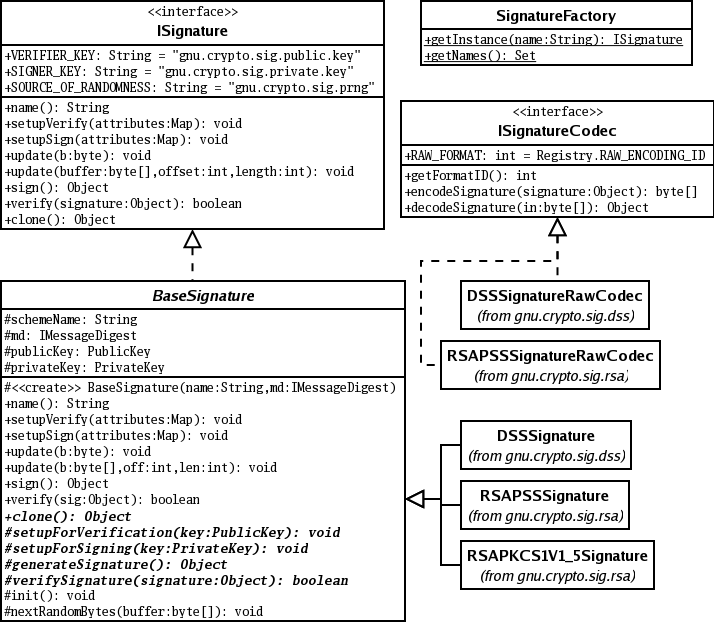
ISignature interface,
and support the following methods:
| java.lang.String SIGNER_KEY | Variable |
A property name in the attributes map that is passed to instances being
prepared for signing. The value mapped by this key must be a
java.security.PrivateKey that is appropriate for the instance's
algorithm (e.g. an instance of DSS would require a subclass of
java.security.interfaces.DSAPrivateKey).
|
| java.lang.String VERIFIER_KEY | Variable |
A property name in the attributes map that is passed to instances being
prepared for verifying a signature. The value mapped by this key must be
a java.security.PublicKey that is appropriate for the instance's
algorithm, just as is the case with the signing key.
|
| java.lang.String SOURCE_OF_RANDOMNESS | Variable |
A property name in the attributes map that is passed to instances being
prepared for use as either signers or verifiers. The value mapped must
be an already-initialized instance of gnu.crypto.prng.IRandom.
|
| void setupSign (java.util.Map attributes) throws java.lang.IllegalArgumentException | Function |
Initializes this instance for signing. The attributes parameter
must be a java.util.Map that has, at least, a mapping between the
SIGNER_KEY property and the appropriate private key.
|
| void setupVerify (java.util.Map attributes) throws java.lang.IllegalArgumentException | Function |
Initializes this instance for verifying a signature. The
attributes parameter must be a java.util.Map that has, at
least, a mapping between the VERIFIER_KEY property and the
appropriate public key.
|
| void update (byte b) throws java.lang.IllegalStateException | Function |
Update either the signing or verifying operation with the next byte in
the message. This method will throw a java.lang.IllegalStateException if
this instance has not been initialized for either signing or verifying.
|
| void update (byte[] buf, int off, int len) throws java.lang.IllegalStateException | Function |
Update either the signing or verifying operation with the next len
bytes of buf, starting at offset. This method will throw a
java.lang.IllegalStateException if this instance has not been
initialized for either signing or verifying.
|
| java.lang.Object sign () throws java.lang.IllegalStateException | Function |
Finishes a signing operation and returns the final signature. This method
will throw a java.lang.IllegalStateException if this instance has not
been initialized for signing.
|
| boolean verify (java.lang.Object signature) throws java.lang.IllegalStateException | Function |
Finishes a verifying operation by checking if the argument, a native signature
object, matches the expected signature. This methods returns true if
the signature is valid, false otherwise. This method will throw a
java.lang.IllegalStateException if this instance has not been
initialized for verifying.
|
| java.lang.String name () | Function |
| Returns the canonical name of this instance's signature algorithm. |
| java.lang.Object clone () | Function |
| Returns a copy of this signature object. |